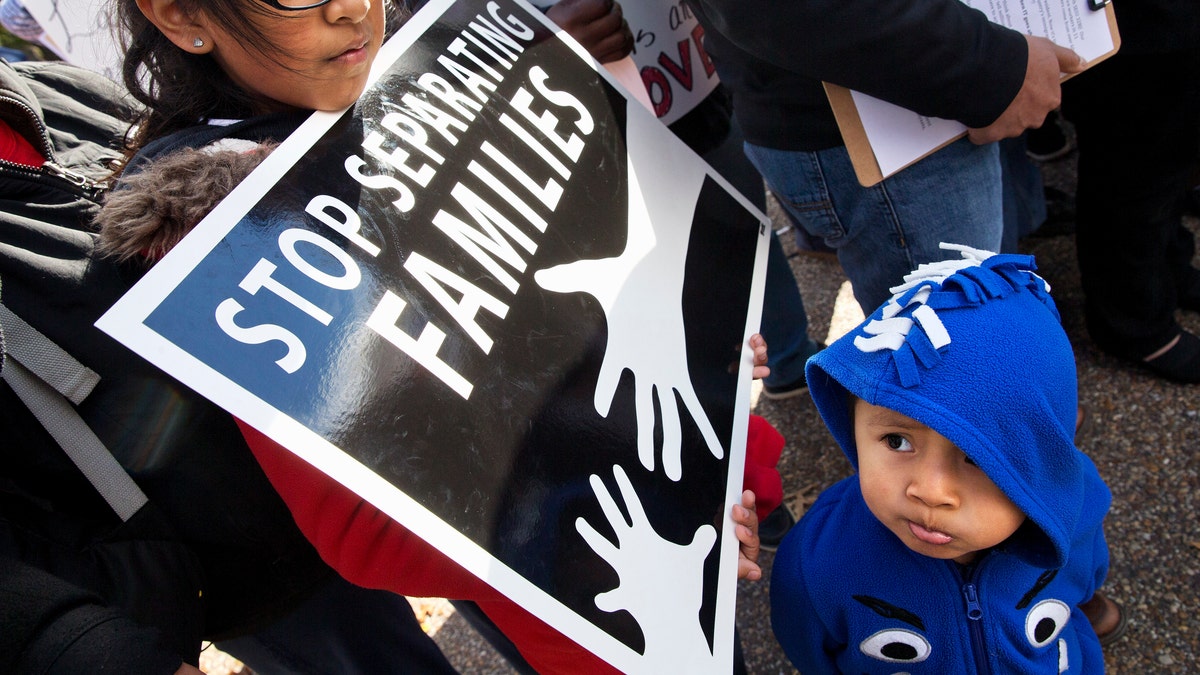
US citizens Esmeralda Tepetate, 10, with her brother Sebastian, 2, whose parents are originally from Mexico, holds a sign that says "stop separating families" during a rally for comprehensive immigration reform, Friday, Nov. 7, 2014, outside of the White House in Washington. After the midterm elections immigration groups are pushing for executive action. (AP Photo/Jacquelyn Martin) (ap)
It is all too easy to misinterpret the vast volume of economic data and form bad conclusions. One such case is the well-intentioned but inaccurate editorial by Justin Velez-Hagan, President of the National Puerto Rican Chamber of Commerce, on your site. Mr. Velez-Hagan claims that the President’s executive order to expand deferred action on a broader base of immigrants will somehow harm the Puerto Rican community.
Immigrants should not be a scapegoat for economic woes that are the result of many decades of bad administration in Puerto Rico by both leading political parties.
The order was designed to keep mixed status families together in a safe harbor while Congress continues to trudge through developing a more comprehensive reform. The design was to provide protection from deportation and legal work authorization to some 4 million immigrant adults that are related to a legally residing or citizen child or through an expansion of DACA, the original Dream Act-like deferred action, to those over 30 that otherwise qualified for the program. As a result, this executive order, like President H.W. Bush’s, was targeted to adults in order to keep families together.
As a member of the military, I am frankly surprised that Mr. Velez would oppose this action that will help countless mixed status families, some including military families where men and women in uniform are suddenly forced to find family to look after their children back stateside after a spouse is arrested and deported. This is an appropriate time of the year to remember that regardless of how American any of us may claim to be, for exception of Native populations, our forefathers were all immigrants, and most of them came without some permit.
With respect to the economic arguments made by Mr. Velez, those are easily discredited. He speaks to the negative impacts a large surge of immigrant workers would have on both the labor force and on wages. Mr. Velez paints the picture of four million people suddenly appearing out of thin air. The fact is that these immigrants have been here for a minimum of five years and often for decades as constructive members of our society and laborers in our economy.
A large body of academic economic research has conclusively found that immigration has a negligible effect on wages or the availability of work for U.S. Citizens. According to widely cited studies from the Harvard Business School and the University of California Berkley, immigrants have an impact of +/- 2 percent on wages depending on the state of the economy. The impact on the availability of jobs also varies very little and, like wages, the effects are limited and “clustered around zero.” According to a CATO Institute report from earlier this year, “nowhere will you find a tradeoff where one additional immigrants means that one American loses a job in the economy.”
Our hope is that, like other generations of immigrants, these will hopefully take advantage of their legal authorization to gain new skills and education so they improve their economic conditions and pass that on to their children. That said, most of the workers impacted by this order with be low wage immigrants, who pose no threat to the much higher educated Puerto Rican workforce. Mr. Velez does get one thing right – Puerto Rico offers a far more competitive workforce than virtually any other place on earth due to its low cost and high education attainment.
One provision in the executive order does allow some foreign graduates with STEM degrees to remain in the United States. Mr. Velez needs only to look at the widely available economic data that shows an insatiable appetitive for STEM graduates in our labor force due to a domestic shortage. A better question would be why does Congress delay on comprehensive immigration reform and continue to allow foreign nations to benefit from the product of our educational system? According to Forbes and a report by The Partnership for a New Economy, “… 25 percent of high tech companies founded between 1995 and 2005 had at least one immigrant founder. 75 percent of the companies funded by American venture capital had ‘one core foreign born team member...’”
Mr. Velez also speaks to the timing of the executive order. By his account the recovery in the United States has been slow and the order would tighten the labor force. The problem is that economic data on job growth disputes this assertion, and again we need to remind Mr. Velez that these workers are already part of the labor force. These are not new additions to the economy. They have been here all along raising families, running businesses, and growing roots in our communities. Our economy is recovering, and while I wish we could snap our fingers and get full employment and recover lost net worth from the Great Recession, we are doing ok and things are getting better.
In the end, we can all sympathize with Mr. Velez frustration over the state of the Puerto Rican economy, but would urge him to redirect that frustration elsewhere. Immigrants should not be a scapegoat for economic woes that are the result of many decades of bad administration in Puerto Rico by both leading political parties.
